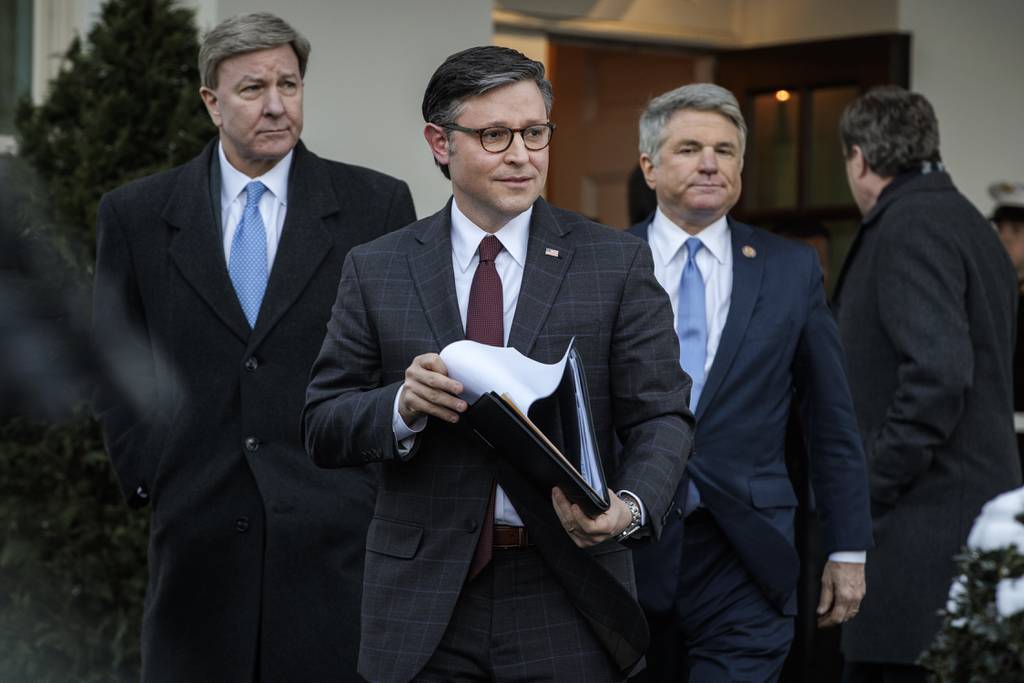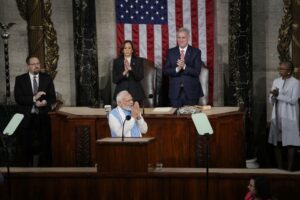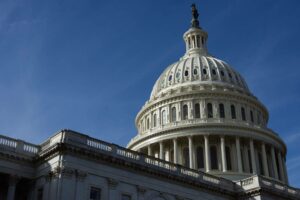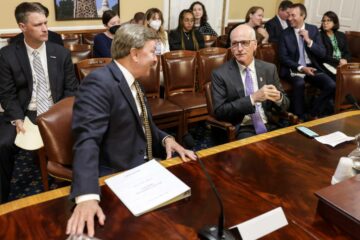
WASHINGTON ― President Joe Biden on Wednesday hosted congressional leaders at the White House in a bid to break the gridlock that has held up a massive foreign aid bill that includes security assistance for Ukraine, Israel and Indo-Pacific partners.
The meeting comes as Congress inches closer to a deal on immigration policy changes Republicans have sought to unlock $61 billion worth of Ukraine assistance.
House Speaker Mike Johnson, R-La., briefly addressed reporters at the White House after the meeting. He was flanked by House Armed Services Chairman Mike Rogers, R-Ala., and Foreign Affairs Chairman Mike McCaul, R-Texas, two strong Ukraine aid proponents.
Johnson called the meeting “productive” and said he pushed for “substantive policy change at the border.”
“We’re not insistent upon a particular name or piece of legislation, but we are insistent that the elements have to be meaningful,” he added. “We understand the necessity about Ukraine funding, and we want to say that the status quo is unacceptable.”
Johnson’s comments appeared to reflect a shift; he previously insisted on pairing Ukraine aid with a House immigration bill strongly opposed by Democrats. He noted he had a phone call with Biden on the topic last week.
Johnson said the Biden administration must answer questions “about the strategy, about the end game and about accountability for the precious treasure of the American people.”
House Republicans have become increasingly skeptical of Ukraine aid in recent months, but Johnson’s comments indicate an increasing openness to trading aid to Kyiv for immigration policy changes.
The Biden administration has said it will not transfer more weapons to Ukraine without more funding from Congress, having used its last $1 billion in December to replenish U.S. stockpiles of arms sent to Kyiv.
House Minority Leader Hakeem Jeffries, D-N.Y., Senate Majority Leader Chuck Schumer, D-N.Y., and Senate Minority Leader Mitch McConnell, R-Ky., also joined the White House meeting.
McConnell, who opted to tie Ukraine aid to immigration policy in the Senate, has argued in favor of a bipartisan immigration deal. He predicted the Senate could vote on the foreign aid spending bill as soon as next week. And Schumer told reporters before the meeting that “for the first time, I think the chances of getting it done in the Senate are greater than not getting it done.”
McConnell and Senate Republicans tanked a roughly $110 foreign aid spending bill last month based on Biden’s October supplemental request because it didn’t include the immigration policy changes.
That bill includes $13.5 billion to continue arming Kyiv through the Ukraine Security Assistance Initiative. It allocates $15.1 billion for the Defense Department to continue supporting the Ukrainians with military training, intelligence sharing and “an increased presence in the European Command area of responsibility,” per a Senate summary of the bill.
On top of that, the bill appropriates $24.5 billion to replenish weapons the U.S. has already sent to Ukraine and Israel through its stockpiles. It also sets aside $2.8 billion to increase capacity for the munitions-industrial base.
“Ukraine is already suffering from a lack of armaments,” Schumer said ahead of the meeting. “If Ukraine folds, we’re going to be suffering the consequences not for months, but for years to come.”
He added that the goal of the White House meeting was “frankly to make it clear that things are changing in Ukraine for the worse, and if we don’t get aid to them quickly, the whole thing could turn around and be irretrievable.”
The bill also includes $14 billion in additional military aid for Israel as it continues its offensive in the Gaza Strip.
Additionally, it allocates $2 billion in Foreign Military Financing for allies and partners in the Indo-Pacific, including Taiwan. It also includes more than $2 billion to improve the capacity of the submarine-industrial base amid congressional concerns the trilateral AUKUS agreement in which the U.S. will send up to five Virginia-class vessels to Australia could further strain Navy production goals.
However, final funding levels may change if and when the Senate reaches a compromise and unveils a new bill.
Bryant Harris is the Congress reporter for Defense News. He has covered U.S. foreign policy, national security, international affairs and politics in Washington since 2014. He has also written for Foreign Policy, Al-Monitor, Al Jazeera English and IPS News.
- SEO Powered Content & PR Distribution. Get Amplified Today.
- PlatoData.Network Vertical Generative Ai. Empower Yourself. Access Here.
- PlatoAiStream. Web3 Intelligence. Knowledge Amplified. Access Here.
- PlatoESG. Carbon, CleanTech, Energy, Environment, Solar, Waste Management. Access Here.
- PlatoHealth. Biotech and Clinical Trials Intelligence. Access Here.
- Source: https://www.defensenews.com/congress/2024/01/18/biden-hosts-hill-leaders-as-congress-inches-toward-ukraine-deal/
- :has
- :is
- :not
- $1 billion
- $2.8 billion
- $UP
- 1
- 12
- 2014
- 70
- 8
- a
- About
- accountability
- added
- Additional
- addressed
- administration
- Affairs
- After
- Agreement
- ahead
- Aid
- AL
- allocates
- already
- also
- American
- Amid
- an
- and
- answer
- appeared
- ARE
- AREA
- argued
- armed
- arms
- around
- AS
- aside
- Assistance
- At
- Australia
- base
- based
- BE
- because
- become
- before
- bid
- biden
- Biden Administration
- Bill
- Billion
- bipartisan
- border
- Break
- briefly
- but
- by
- call
- called
- Capacity
- chairman
- chances
- change
- Changes
- changing
- chuck
- clear
- closer
- come
- comes
- comments
- compromise
- Concerns
- Congress
- Congressional
- Consequences
- continue
- continues
- could
- covered
- deal
- December
- Defense
- Defense Department
- Democrats
- Department
- done
- Dont
- elements
- end
- English
- European
- favor
- final
- financing
- First
- first time
- five
- folds
- For
- foreign
- foreign policy
- from
- funding
- further
- game
- get
- getting
- goal
- Goals
- going
- greater
- had
- Have
- having
- he
- Held
- hosted
- hosts
- House
- HTTPS
- i
- if
- images
- immigration
- improve
- in
- inches
- include
- includes
- Including
- Increase
- increased
- increasing
- increasingly
- indicate
- Initiative
- Intelligence
- International
- Israel
- IT
- ITS
- joe
- Joe Biden
- Johnson
- joined
- jpg
- Lack
- Last
- leader
- leaders
- Legislation
- levels
- Majority
- make
- massive
- May..
- meaningful
- meeting
- mike
- Military
- minority
- Mitch McConnell
- Month
- months
- more
- must
- name
- National
- national security
- necessity
- New
- news
- next
- next week
- noted
- october
- of
- offensive
- on
- Openness
- opposed
- or
- pairing
- particular
- partners
- People
- per
- phone
- Phone call
- piece
- plato
- Plato Data Intelligence
- PlatoData
- policy
- politics
- Precious
- predicted
- presence
- president
- president joe biden
- previously
- Production
- pushed
- Questions
- quickly
- Reaches
- recent
- reflect
- replenish
- reporter
- Republicans
- responsibility
- Rogers
- roughly
- s
- Said
- say
- security
- Senate
- send
- sent
- Services
- Sets
- sharing
- shift
- since
- skeptical
- Soon
- sought
- Speaker
- Spending
- Status
- Strategy
- Strip
- strong
- strongly
- suffering
- SUMMARY
- Supporting
- Taiwan
- Tanked
- than
- that
- The
- Them
- thing
- things
- think
- Through
- TIE
- time
- to
- told
- top
- topic
- toward
- Trading
- Training
- transfer
- TURN
- two
- u.s.
- Ukraine
- Ukrainians
- understand
- unlock
- Unveils
- upon
- used
- vessels
- Vote
- want
- was
- washington
- we
- Weapons
- Wednesday
- week
- when
- which
- white
- White House
- WHO
- whole
- will
- with
- without
- worse
- worth
- written
- years
- zephyrnet












